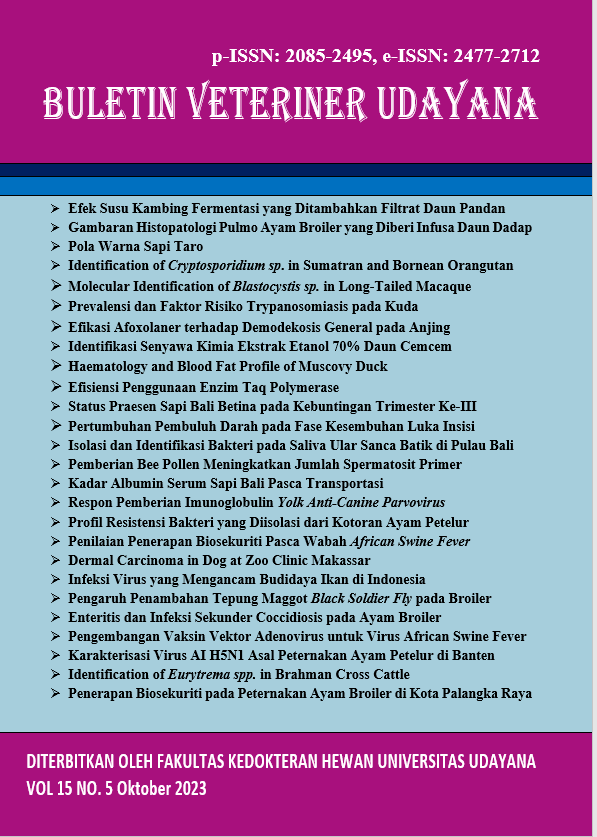RESPONSE OF ANTI-CANINE PARVOIRUS IMUNOGLOBULIN YOLK ADMINISTRATION ON PUPPY RAISED IN CANINE PARVOVIRUS CONTAMINATED AREA
Abstract
Canine parvovirus is an infectious virus that mostly affects puppies. So far, prevention and therapy of CPV infection in dogs has been limited to providing supportive therapy. Prevention of CPV infection is very important, especially in puppies whose parents have not been vaccinated. The purpose of this study was to determine the response of puppies given egg yolk containing IgY anti-CPV dose of 3 ml/head/day and kept in a contaminated location. One possible modality is the administration of passive antibodies in the form of egg yolk containing antibodies (Immunoglobulins Yolk/IgY) that are specific for CPV. This study used 5 puppies aged 2 months divided into two groups, treatment group (P) which was given 3 ml/head/day of anti-CPV IgY with a dose of 214 HI units and 2 control groups. For 14 days the dogs were observed for clinical symptoms, serum was tested by the HI method to determine the presence of antibodies to CPV and leukocyte profile was detected by blood smear and examined manually under a microscope. The results showed that the maternal antibody titer was below the protective titer. Provision of egg yolk containing anti-CPV IgY was able to maintain protective antibody titers up to day 12 of treatment. Of the 3 puppies who were given egg yolks containing IgY, two of them died because they were positive for CPV. One recovered after Intravenous IgY anti-CPV therapy. It was concluded that the administration of anti-CPV IgY egg yolk at a dose of 3 ml/puppy/day was not protective enough to protect puppies from CPV infection. Effectivity can be increased by increasing the dose given.
Downloads
References
Hoskins JD. 1998. Canine viral enteritis. In: Greene CE, ed. Infectious Diseases of the Dog and Cat. 2nd ed. Philadelphia: WB Saunders: Pp. 40–48.
Ikemori Y, Kuroki M, Peralta RC, Yokoyama H, Kodama Y. 1992. Protection of neonatal calves against fatal enteric colibacillosis by administration of egg yolk powder from hens immunized with K99-piliatedenterotoxigenic Escherichia coli. Am. J. Vet. Res. 53: 2005-2008.
Ikemori Y, Ohta M, Umeda K, Icatlo F, Kuroki M, Yokoyama H, Kodama Y. 1997. Passive protection of neonatal calves against bovine coronavirus-induced diarrhea by administration of egg yolk or colostrum antibody powder. Vet. Microbiol. 58(2-4): 105-111.
Kuroki M, Ikemori Y, Yokoyama H, Peralta RC, Icatlo FCJ, Kodama Y. 1993. Passive protection againts bovine rotavirus-induced diarrhea in murine model by specific immunoglobulins from chicken eggyolk. Vet. Microbiol. 37: 135–146.
Lobetti R. 2003. Canine parvovirus and distemper-world small animal veterinary association world congres proceedings htttp://www.vin.com/proceeding/Proceedings.pxl.Diakses pada 20 Mei 2022
Meunier PC, Cooper BJ, Appel MJG, Slauson DO. 1985. Pathogenesis of canine parvovirus enteritis. The importan viraemia. Vet. Pathol. 2: 60-71.
Nguyen SV, Umeda K, Yokoyama H, Tohya Y, Kodama Y. 2006. Passive protection of dogs against clinical disease due to Canine parvovirus-2 by specific antibodi from chicken egg yolk. Can. J. Vet. Res. 70: 62-64.
Suartha IN, Mustikawati D, Erawan IGMK, Widyastuti SK. 2011. Prevalensi dan faktor risiko penyakit virus parvo pada anjing di Denpasar. J. Vet. 12: 235-240.
Suartini GAA, Suprayogi A, Wibawan, Sendow I, Mahardika G. 2014. Intravenous administration of chicken immunoglobulin has a curative effect in experimental infection of canine parvovirus. Glob. Vet. 13(5): 801-808.
Suartini I, Sendow I, Agustini N, Suprayogi A, Wibawan I, Mahardika I. 2016. Kinetika immunoglobulin kuning telur antiparvovirus anjing pada anjing. J. Vet. 17(2): 292-299.
Terzungwe TM. 2018. Hematological parameters of dogs infected with canine parvovirus enteritis in sumy. World J. Inov. Res. 5(3): 1-5.
Tini M, Jewell UR, Camenisch G, Chilov D, Gassmann M. 2002. Generation and application of chicken egg-yolk antibodies. Comp. Biochem. Physiol. A. 131: 569-574.
Yousif AA, Mohammad WA, Khodeir MH, Zeid AZ, el-Sanousi AA, Saber MS, Reda IM. 2006. Oral administration of hyperimmune IgY: an immunoecological approach to curbing acute infectious bursal disease virus infection. The Egyp. J. Immunol. 13(2): 85–94.





